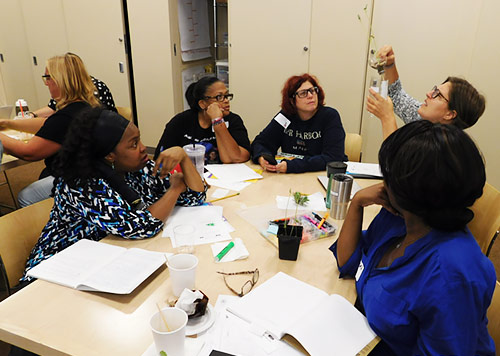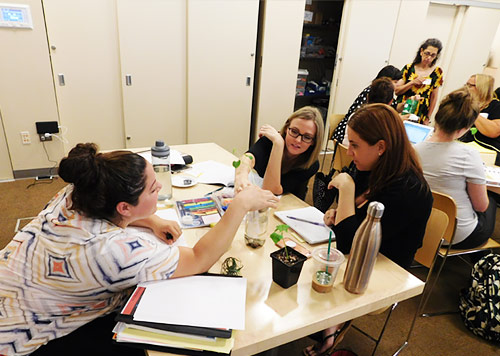Elementary Program
Celebrating 20 years of “learning science by doing science"
Since 2004, eight of New York City’s leading cultural institutions — including museums, zoos, and botanical gardens — have worked with the New York City Public Schools to support high-quality research-based science instruction in the city’s elementary and middle schools. Urban Advantage includes the American Museum of Natural History, the Brooklyn Botanic Garden, the New York Botanical Garden, the New York Hall of Science, the Queens Botanical Garden, the Staten Island Zoo, the Wildlife Conservation Society’s Bronx Zoo and New York Aquarium, and the New York City Public Schools, with leadership funding from the New York City Council.
Urban Advantage’s Six Research-based Components
UA is designed to support the science goals of the public-school system and supports grades 3-8. It is founded on six key components designed to support schools, principals, teachers, students and families. Click on each of the six components below to learn more:
what we do
Teacher participants order classroom materials with an annual budget during their first years of participation.
why we do it
Students and Teachers practice phenomena-based science in materials-rich classrooms, enabling deeper exploration of concepts and practices.
Effect on students
Students learn in classrooms that are annually enriched with curriculum-supporting and extending science materials and equipment.
what we do
UA continuously reviews course effectiveness, and the program's impacts on student learning and teacher growth.
why we do it
Through our own internal research, and through partnerships with renowned universities, UA has looked at long-term impacts on student outcomes and teacher retention. Recently, we have begun measuring UA’s effect on teacher social networks.
Effect on students
Students are more likely to learn from seasoned teachers and to have improved test scores. UA Students are more likely to have veteran teachers with more years of experience teaching at their UA school, as UA participation helps schools retain science teachers. UA students are also more likely to take and pass the Living Environment Regents exam and to score higher on state tests.
what we do
Parent Coordinator workshops, family and student events at institutions, and partner attendance at school events.
why we do it
UA’s Family Engagement initiative creates events for families to explore, learn about, and make memories at partner institutions. UA holds annual PC workshops to help plan and execute school community trips and to help PCs gain valuable professional learning experience. Partners also attend school events to support learning and expand access to the whole school community.
Effect on students
Students participate in Scientific Exploration with their families. Students who learned in UA-participating schools have consistently been prompted to seek intergenerational knowledge, to ask curiosity questions, and to make connections, all practices that support solid science practice and family engagement.
what we do
UA creates and encourages opportunities for students and families to explore UA institutions. Teachers and parent coordinators have access for curriculum- and family engagement-supporting trips.
why we do it
Students and Teachers learn to see UA institutions and their staff as extensions of their classrooms. Access and comfort with the institutions support student growth and interest in the sciences, teacher retention, and public school partnership with the local institutions.
Effect on students
Students feel at Home in NYC’s Science-Rich Cultural Institutions. Students that spend any portion of elementary and/or middle school at a UA-participating school will have had experience on school group trips to our institutions and the opportunity to visit with their families for the duration of their education.
what we do
UA's PL focuses on science pedagogy and helps teachers transfer what they learn to their classrooms through immersive experiences with reflection, planning, and participation in communities of practice.
why we do it
Participants form a community of science teachers from across the city. The courses they take concentrate in areas of focus that expand the understanding of what teaching and learning science looks like in a comprehensive, research-informed way.
Effect on students
Students learn from teachers well versed in research-based pedagogical practices and methods. Teachers who complete UA’s PL courses lead classrooms that center student voice and interests, employ current local phenomena, and use reflective practice to ensure students are learning in the best environment possible.
what we do
UA’s Lead Teacher and Fellows Programs aid in the promotion of school-based expert teacher leaders.
why we do it
Participating in UA’s Fellows or Lead Teacher programs enables teachers to delve further into their practice, expertise, and deepen their experience. These teachers become models and leaders in their schools.
Effect on students
Students explore science comprehensively.UA Students are taught by teachers who learn from and work alongside those in the Fellows and Lead Teacher program. This offers teachers the unique opportunity to trust the methods being taught, as they have been tried and tested for efficacy. Students then learn in classrooms that are evidence-based, responsive, and informed.
Learn how UA supports the NYC Public School's science initiatives and the NY State Science standards by clicking here
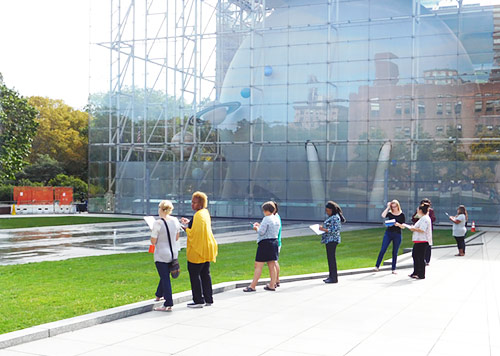
The transformative work being done by Urban Advantage teachers in their middle school classrooms across the five boroughs inspired the UA team to extend this work into the elementary schools in the city. The Elementary Program is designed to address the pressing need for STEM literacy among elementary school students and to equip teachers of grades 3, 4, and 5 with the tools, skills, and techniques to engage students effectively in STEM learning. It puts greater emphasis on the role of student thinking and questioning, explanations, and investigations in the classroom in the form of whole class explorations of science phenomena from the natural world.
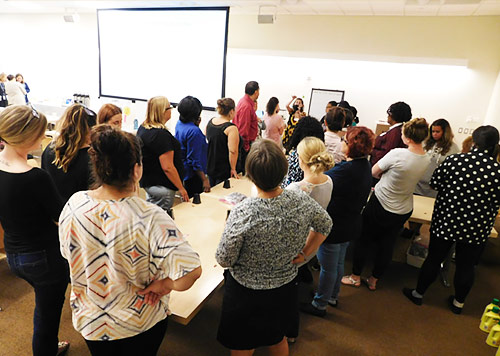
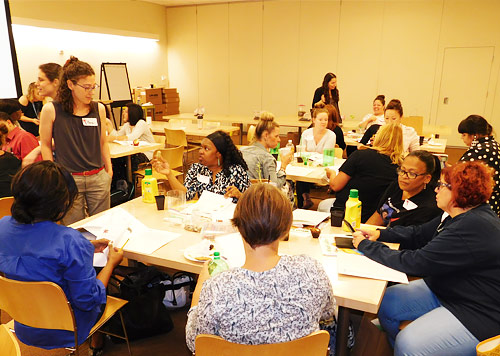
As we continue to grow, we will work with more schools and teachers across the five boroughs to increase the participation of students in STEM learning experiences and exploration.
Some participant thoughts:
“I felt confident that being here as a learner and as a teacher, that I knew what I was doing. Because we don’t always know all the content that we’re supposed to know. So [being here] gave me confidence to do the next unit in my science, and it was nice to just be with like-minded people and feel comfortable.” ~UA Elementary Teacher
“I always leave with the feeling that I have learned something new.” – UA Elementary Administrator
“[This program] has made me love teaching science again!” – UA participant
“I think that’s something that has been done very reflectively in this program, making us feel like learners, and separating that learner/teacher mindset and I find myself using that when I’m planning on my own and that’s because of how this program is structured and how we’re forced to think like a learner, like a kid. What would that question sound like, we kept rephrasing our questions and our claims, based on what would a 4th grader say, what would a 3rd grader say?” –UA Elementary Teacher
